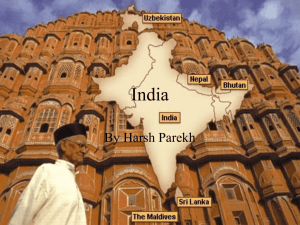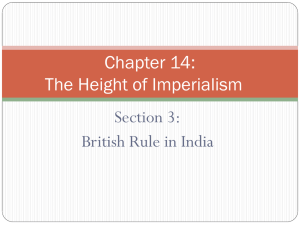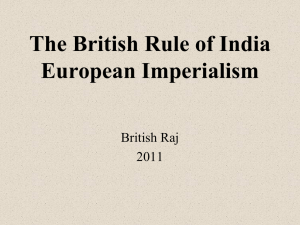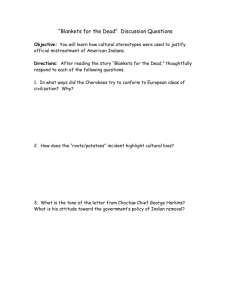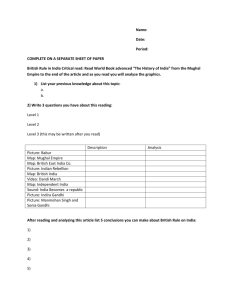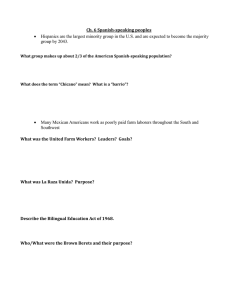British East Indian Trading Company leads to British Imperialism
advertisement
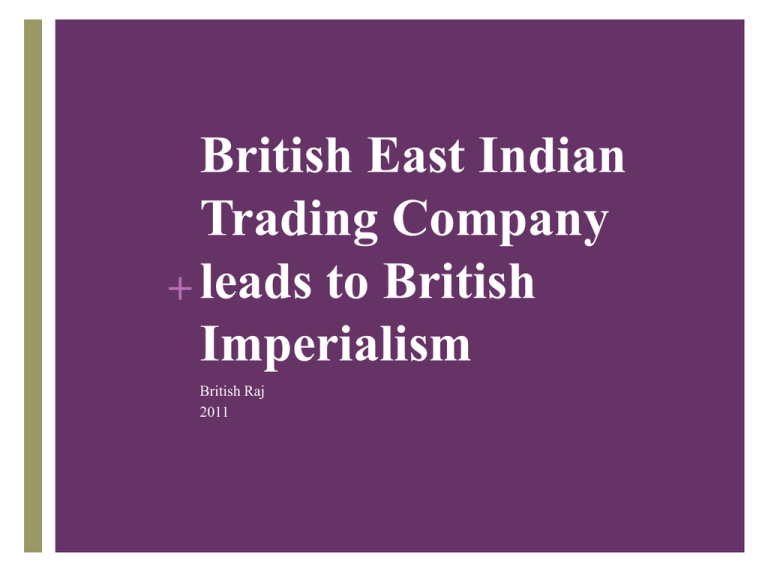
British East Indian Trading Company + leads to British Imperialism British Raj 2011 + Decline of the Mughal Empire allows for Europeans/British to come to South Asia. In the beginning, it was trading companies-that established ports /settlements as the Mughals Empire was declining in power. I + Aurangzeb- The Last Mughal Emperor! After a two-year fight for succession that resulted in Shah Jahan's imprisonment, Aurangzeb (1658– 1707) assumed the throne. By the mid-18th century, the once great Mughal Empire was confined to a small area around Delhi. Aurangzeb reversed Akbar’s policies of tolerance! Vasco De Gama - Portugal- 1st explorer establish a sea route from Europe to India. Once established the Dutch, British & French will establish + trading post in South Asia. These routes & advancements in ships lead to trading companies in South Asia. + East India Trading company- 1600’s 150 years British company (not government) established cities. Britain was Not a Imperial, conquering nation at this time & Mughal Empire still in control- watched over British trade cities. + Major Trading Cities for East Indian Company and other countries… Kolkata , Madras and Bombay Other Europeans also establish settlements… British consumers wanted Indian Goods! • + • • Hand woven Indian textiles, high quality, hand loomed fabrics Indigo blue dye Saltpeter used for gun powder European Industrialization led to Imperialism! The Industrial Revolution was a period from 1750 to 1850. + Britain was the first to industrialize. It is called a revolution because it changed society significantly and rapidly and led to modernization & urbanization. British Trader’s ambitions… + British begin to replace local rulers with rulers that were more favorable to the British traders! Robert Clive, Clive of India, was British officer who established the military and political supremacy of the East India Company in Bengal. + How could the British East India Company take over? Wealth of Bengal 1765- used the money to finance a army . Indian Sepoy--pay & pension soldiers & recruit the Indians No Indian Nationalism, no sense of being an Indian, ties to caste and regional . East India Company strengthens army and takes over more of India over the next 100 years.. + East India Co.- Sepoy stArmy works well for over 100 years- until 1 revolt-1857 Rebellion Called the “Sepoy Rebellion” In 1857, A rumor spread among soldiers that the British were greasing their bullets with the fat of cows and pigs Resentment has grown over the “superiority” of the British in India. + Picture of Sepoy rebellion + Justice! After the Sepoy Rebellion, the British government takes over the rule of East India Company in India. India becomes ….The Jewel of the British Empire! Queen Victoria is the Empress of India. + Honoring the empress + Jewel of the British Empire Trade with and eventual political dominance over India was what provided Britain with large parts of it's wealth in the 17001900's. India provided huge resources and massive markets for British factories and goods. It provided tax income, natural mineral wealth. + European Imperialism + The Devilfish in Egyptian Waters + The British Empire How did the British + justify taking over India? Many British was the Indians as ignorant, marred in superstition, & caste prejudices'. The British brought the English language, superior western ways. + How did the British justify taking over India? God’s Chosen People Protestant/Evangelical Sanctity of Family & Home + Two Views of Indian Life Two views of Indian Life + Rudyard Kipling The White Man’s Burden + Sir Thomas Macaulay (1800-1859) Macaulay’s Minute on Education + What then shall that language be? Sanskrit or English? Schools will teach.. British history, culture Religion. A creation of a class of Anglicized Indians who would serve as intermediaries between the British & their Indian subjects. The British Raj 1857-1947 The new government of India was called the Raj, a Sanskrit word meaning to rule. + Generally, Indians had no rights and no voice in their own rule. Lack of Indian representation in government and an economic system that was seen as a drain on India's wealth were the primary causes of agitation against British rule in India. + A class of Anglicized Indians & Indian Civil Service (ICS) Viceroy- British Top Official in India. Elite-Englishmen & Indian officials at highest level of ICS. + British begin census, tracking of Hindus & Muslims- defining Indians by religion. Divide & Conquer strategy- if distrust between the two groups they cannot unite against the British Remember; Muslim’s had ruled over sub-continent for over 500 years. These divisions and past tensions between Hindus & Muslims will lead to devastation once Britain becomes independent. + 1857- 1947- British Raj Colonial rule a positive or negative? Modernization, education, infrastructure- Railroads Improved Roads & sea ports Built Railroads & telegraphy system Improved healthcare & sanitary conditions Established schools for elite class of Indians (based on western values & history) Tax revenues from agriculture and industry that should have benefitted India instead went to England. Racism & economic exploitation Discouraged Indian industriesneed Indians to buy expensive western goods- Duty free British goods Widespread famine & food shortages. According to official figures, 28 million Indians starved to death between 1854 and 1901. Criticism of Indian religions, culture and customs. + Rise of Nationalism a sentiment based on common cultural characteristics that binds a population and often produces a call for independence. At first these groups call for equality, better opportunities. Ultimately, they will call for independence. Indian National Congress Muslim League Political organization/political party in modern times. Political organization to protest Muslim rights/party Gandhi & J. Nehru M. Ali Jinnah + Stop here. Complete after the Gandhi Film. + Mahatma Gandhi (1869-1948) + Gandhi Spinning Cloth + Harbor no anger, but suffer the anger of the opponent. Do not return assaults Do not submit to an order given in anger Refrain from insults and swearing Gandhi’s Satyagraha Protect Principles of resistance to British rule, using nonviolent, peaceful protests/actions. If Civil Disobedience, act of refusal to obey unjust laws. the opponents from insult or attack, even at the risk of life taken prisoner, behave in an exemplary manner Obey the orders of the satyagraha leaders + The 1930 Salt March (ex. of civil disobedience) According to law, the British had a monopoly on the manufacture and sale of salt. Indians were arrested if they tried to make salt. Gandhi directly defied British law and marched to the ocean to collect salt. Salt March Monument + Gandhi picks up a grain of salt in defiance of British law. + PARLIAMENT BUILDING New Delhi, India
